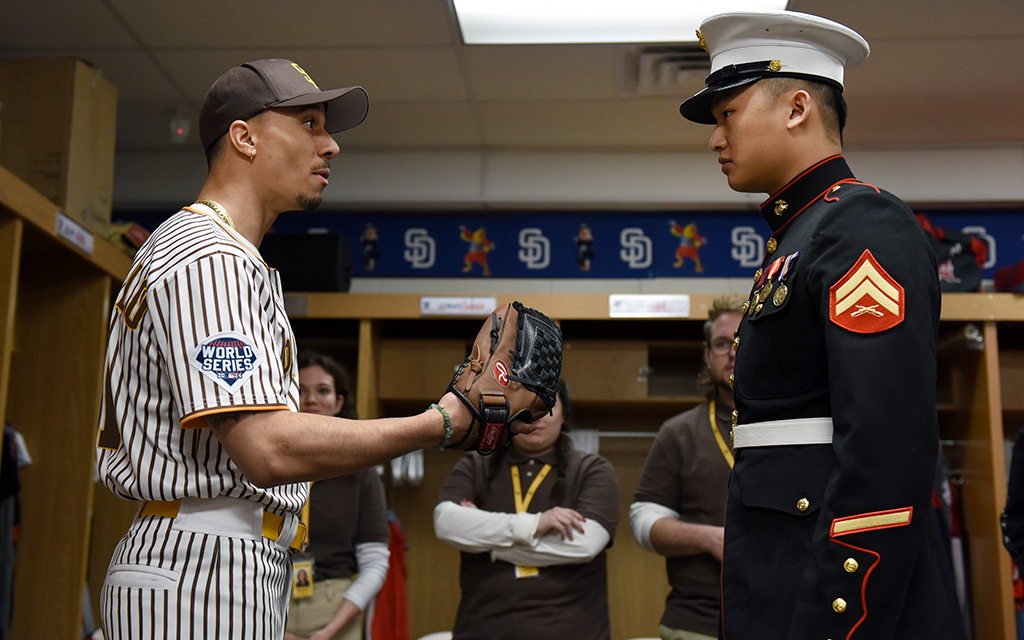
NFL 360, which produces short-form documentaries on the intersection of football and race, gender and nationality, worked with ASU students on the art of storytelling during Super Bowl week. (Photo by Aidan Richmond/Cronkite News)
MESA – The NFL ran a masterclass for Arizona State University students last Wednesday at the Sidney Poitier New American Film School, where they provided an in-depth analysis of the filmmaking techniques and processes used by NFL 360 in their series of documentaries.
Students attending the event were taught the intricacies of the documentary-making processes used at NFL 360, particularly how to work around limited budgets and timeframes to tell meaningful stories.
The presenters gave students a key understanding of how to tell a meaningful human story through striking visuals and a passionate spirit.
“I’m a big believer in giving people constraints to work within and be creative within. When you give people boundaries, it’s like a diamond, the better quality you’re going to get out of it,” NFL 360 co-creator Dallas Hitchcock said. “Having constraints creates a much better product at the end of the day because that passion comes into play.”
The masterclass came a day after NFL 360 – a brand of NFL Media that creates content about stories that are “bigger than football” – released its latest documentary on Jimmy Raye, a black quarterback from Fayetteville, North Carolina who left the segregated South to play for one of the only integrated college programs in the country at Michigan State.
The documentary titled The Indelible Legacy of Jimmy Raye, which first aired on NFL Network, goes beyond the NFL’s past and turns to criticize the NFL’s present, where Black head coaches and executives continue to struggle to find meaningful employment in the higher ranks of NFL franchises.
The documentary aligns with NFL 360’s focus on the intersection of football and race, gender and nationality. Other recent documentaries include a look at how Polynesian culture and football meet in Hawaiian high school football and how members of the Ukrainian League of American Football have had to fight for their country amid an ongoing war.
The film’s director and producer, Osahon Tongo, sees his film as a way for people to better understand Raye’s story – and the history that accompanies it.
“One of the things I learned from doing the piece is, seeing these historical events through the lens of somebody who went through all this. It hits different than if you read it in a textbook,” Tongo said. “The whole league is standing on the shoulders of people like this who push boundaries.”
Despite making the film for the NFL’s official platforms, Tongo didn’t shy away from portraying the shortcomings of the league’s 32 clubs.
“My North star is always being honest, and, since I love this game so much, I want to hold it accountable because we do want the change,” Tongo said.
The film debuted shortly after the latest round of NFL coaching hires following the regular season. The only Black coach hired was DeMeco Ryans, who replaced another Black head coach in Lovie Smith for the Houston Texans.
“It’s always disappointing. Sometimes they’ll interview them on the backend just to fulfill the Rooney Rule. … Every year is some type of disappointment,” Tongo said about the latest round of coaching hires. “I mean, the number of former players that are moving through the ranks, that are of color, that are not even getting looked at, it’s kind of irritating.”
NFL 360 knows the topics can be uncomfortable for viewers and may not resonate with all football fans, but the goal to provide a clear and accurate portrayal of America’s most popular professional sports league is the top priority.
“They can turn the channel,” Tongo said about how teams feel about unreceptive fans. “You need to understand that the history of the league stands on men like this. You have Lamar Jackson, you have Pat Mahomes and Jalen Hurts; they think it’s important. … The offensive coordinator for your favorite team has a whole life story, and I think it’s important for you to know that.”
In the masterclass, the presenters focused on how to handle challenging topics in a way that is respectful and not exploitative. India Wright, director and producer of Solomon Thomas / Breathe, drove these efforts home in a documentary that details the story of Solomon Thomas and his sister Ella’s suicide.
For her documentary, she highlighted the importance of consulting with a psychiatrist beforehand in order to approach the difficult interviews in a respectful and delicate manner.
“The last thing we want to do is trigger them and exploit the death of their daughter, the death of their sister,” Wright said. “You have to realize that while it’s my story, it’s their lives and they are giving us this immense amount of trust to allow us to come in and tell their story.”
NFL 360 gave ASU film students an example of how to create meaningful stories at the intersection of sports and real-world issues in a delicate manner, all while navigating monetary and time constraints.
“I learned how to tell these stories; to tell others’ stories without being disrespectful and helping to share an accurate representation of their lives,” ASU film student Stephanie Santa Cruz said.

